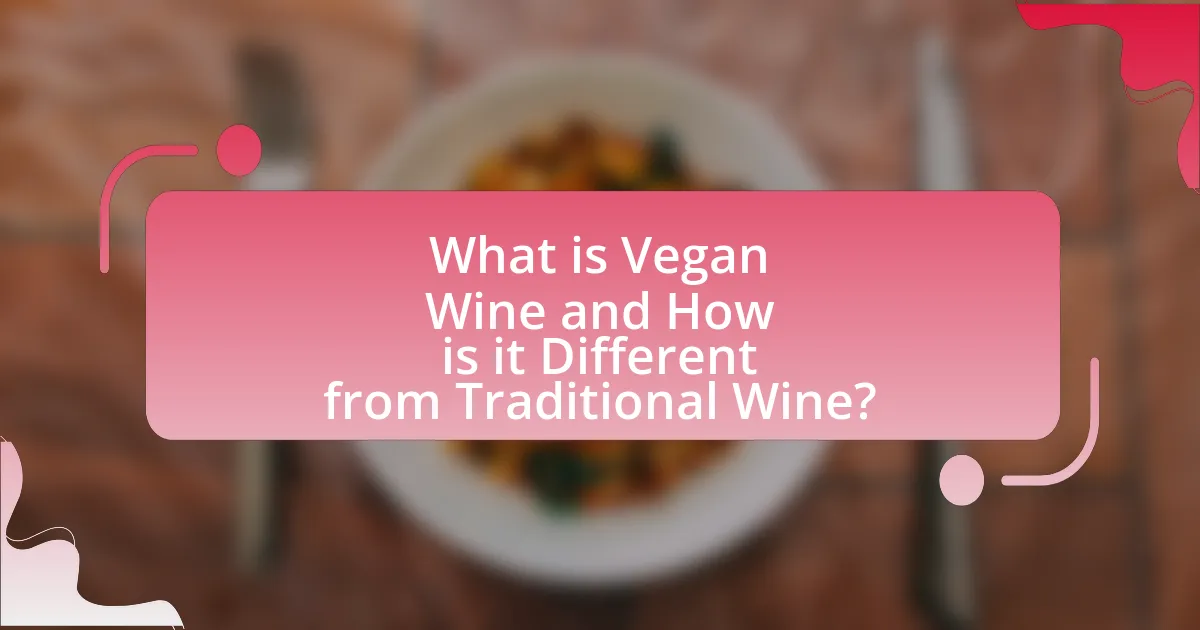Vegan wine is defined as wine produced without animal-derived fining agents, distinguishing it from traditional wines that often use substances like egg whites and gelatin. The article explores the ingredients used in vegan wine production, the significance of vegan certification, and how consumers can identify vegan wines. Additionally, it discusses the characteristics of plant-based dishes, their health benefits, and how they complement vegan wines. Emerging trends in the vegan wine and plant-based food industry, along with practical tips for pairing vegan wines with plant-based meals, are also highlighted, providing a comprehensive overview of the intersection between vegan wines and plant-based cuisine.

What is Vegan Wine and How is it Different from Traditional Wine?
Vegan wine is wine that is produced without the use of animal-derived fining agents, which are commonly used in traditional wine production. Traditional wines often utilize substances such as egg whites, gelatin, or isinglass (fish bladder) to clarify and stabilize the wine, whereas vegan wines rely on alternative fining agents like bentonite clay or activated charcoal. This distinction is significant for consumers who follow a vegan lifestyle, as it ensures that no animal products are involved in the winemaking process.
What ingredients are used in vegan wine production?
Vegan wine production primarily uses grapes, water, and yeast. Unlike conventional wine, vegan wine avoids animal-derived fining agents such as egg whites, gelatin, or casein, which are often used to clarify the wine. Instead, vegan winemakers may utilize plant-based alternatives like bentonite clay or activated charcoal for the fining process. This adherence to plant-based ingredients ensures that the wine remains free from animal products, aligning with vegan principles.
How do fining agents affect the vegan status of wine?
Fining agents can compromise the vegan status of wine because many traditional fining agents are derived from animal products. Common fining agents such as egg whites (albumin), gelatin, and casein are used to clarify wine, and their presence means the wine is not suitable for vegans. Research indicates that wines fined with these agents may contain trace amounts of animal proteins, which further disqualifies them from being labeled as vegan. Therefore, for a wine to be considered vegan, it must be fined using plant-based alternatives like bentonite clay or activated charcoal.
What are common non-vegan fining agents to avoid?
Common non-vegan fining agents to avoid include gelatin, isinglass, casein, and egg whites. Gelatin, derived from animal collagen, is frequently used in wine and juice clarification. Isinglass, obtained from fish bladders, is another common fining agent in the beverage industry. Casein, a milk protein, is often utilized in the clarification of wines and beers. Egg whites, or albumin, are also used for fining in various alcoholic beverages. These agents are not suitable for vegan diets, making it essential for consumers to check labels or inquire about fining processes when selecting vegan-friendly products.
Why is the vegan certification important for wine?
Vegan certification is important for wine because it assures consumers that the wine is produced without the use of animal-derived fining agents. Many traditional winemaking processes utilize substances like egg whites, gelatin, or casein, which are not suitable for vegans. The certification provides transparency and aligns with the ethical and dietary preferences of vegan consumers, who seek products that do not involve animal exploitation. According to a 2021 survey by the Vegan Society, 79% of respondents indicated that they would prefer vegan-certified products, highlighting the growing demand for such transparency in the food and beverage industry.
What organizations provide vegan certifications for wine?
Organizations that provide vegan certifications for wine include the Vegan Society, which offers a trademark for products that meet their vegan standards, and Vegan Action, which certifies products that do not contain animal-derived ingredients. Additionally, the Certified Vegan logo, recognized internationally, is used by various wineries to indicate their commitment to vegan practices. These organizations ensure that the wines are free from animal products and meet specific ethical standards.
How can consumers identify vegan wines on the market?
Consumers can identify vegan wines on the market by looking for specific labeling that indicates the wine is vegan-friendly. Many producers now include “vegan” on their labels, and consumers can also check for certifications from organizations that verify vegan products. Additionally, consumers can research the winery’s production methods, as vegan wines are made without animal-derived fining agents such as egg whites, gelatin, or casein. According to a study published in the Journal of Wine Research, approximately 60% of wines are fined using animal products, making it essential for consumers to verify this information to ensure their choice aligns with vegan principles.

What are the Key Characteristics of Plant-Based Dishes?
Key characteristics of plant-based dishes include the exclusive use of ingredients derived from plants, such as vegetables, fruits, grains, legumes, nuts, and seeds. These dishes are typically rich in dietary fiber, vitamins, and minerals while being low in saturated fats and cholesterol. Research indicates that plant-based diets can reduce the risk of chronic diseases, including heart disease and diabetes, due to their high antioxidant content and anti-inflammatory properties. Additionally, plant-based dishes often emphasize sustainability and environmental benefits, as they generally require fewer natural resources compared to animal-based foods.
How do plant-based dishes differ from vegetarian and vegan meals?
Plant-based dishes primarily focus on whole, minimally processed foods derived from plants, while vegetarian meals include dairy and eggs, and vegan meals exclude all animal products. Plant-based diets emphasize fruits, vegetables, grains, legumes, nuts, and seeds, often prioritizing health benefits and sustainability. In contrast, vegetarian meals may contain cheese and eggs, and vegan meals strictly avoid any animal-derived ingredients, including honey. This distinction highlights that while all three diets center around plant foods, the inclusion or exclusion of specific animal products differentiates them.
What are the main components of a balanced plant-based diet?
A balanced plant-based diet primarily consists of fruits, vegetables, whole grains, legumes, nuts, and seeds. These components provide essential nutrients such as vitamins, minerals, fiber, protein, and healthy fats. For instance, fruits and vegetables are rich in vitamins A and C, while whole grains offer dietary fiber and B vitamins. Legumes, including beans and lentils, serve as excellent sources of protein and iron. Nuts and seeds contribute healthy fats and additional protein. Research indicates that diets rich in these components can reduce the risk of chronic diseases, supporting the health benefits of a well-rounded plant-based diet.
How can one ensure nutritional adequacy in plant-based dishes?
To ensure nutritional adequacy in plant-based dishes, one should incorporate a variety of whole foods, including legumes, whole grains, nuts, seeds, fruits, and vegetables. This diverse selection provides essential nutrients such as protein, iron, calcium, omega-3 fatty acids, and vitamins B12 and D. Research indicates that a well-planned plant-based diet can meet all nutritional needs, as evidenced by a study published in the Journal of the Academy of Nutrition and Dietetics, which found that individuals consuming a varied plant-based diet had adequate nutrient intake comparable to omnivores.
What are the benefits of incorporating plant-based dishes into your diet?
Incorporating plant-based dishes into your diet offers numerous health benefits, including improved heart health, weight management, and reduced risk of chronic diseases. Research indicates that diets rich in fruits, vegetables, whole grains, and legumes can lower blood pressure and cholesterol levels, contributing to cardiovascular health. A study published in the Journal of the American Heart Association found that plant-based diets are associated with a 32% lower risk of heart disease. Additionally, plant-based diets are often lower in calories and higher in fiber, which aids in weight management and promotes satiety. Furthermore, the World Health Organization recognizes that a diet high in plant foods can reduce the risk of type 2 diabetes and certain cancers, reinforcing the importance of incorporating these dishes into daily meals.
How do plant-based diets impact health and wellness?
Plant-based diets significantly improve health and wellness by reducing the risk of chronic diseases and promoting overall well-being. Research indicates that individuals following plant-based diets have lower rates of heart disease, hypertension, type 2 diabetes, and certain cancers. A study published in the Journal of the American Heart Association found that plant-based diets are associated with a 25% lower risk of heart disease. Additionally, plant-based diets are rich in essential nutrients, fiber, and antioxidants, which contribute to better digestive health and enhanced immune function. The World Health Organization also recognizes the benefits of plant-based diets in preventing obesity and promoting a healthy weight.
What environmental benefits are associated with plant-based eating?
Plant-based eating significantly reduces greenhouse gas emissions, as livestock production is responsible for approximately 14.5% of global emissions according to the Food and Agriculture Organization. Additionally, plant-based diets require less land and water; for instance, producing one kilogram of beef requires about 15,000 liters of water, while producing one kilogram of vegetables typically requires less than 1,000 liters. This shift to plant-based foods can also lead to decreased deforestation rates, as less land is needed for animal agriculture, which is a major driver of habitat loss. Overall, adopting a plant-based diet contributes to a more sustainable food system by lowering environmental impacts associated with food production.

How Can Vegan Wine and Plant-Based Dishes Complement Each Other?
Vegan wine and plant-based dishes complement each other by enhancing the flavors and textures of the meal while adhering to a plant-based lifestyle. Vegan wines, which are made without animal-derived fining agents, often exhibit a range of flavors that can match the diverse profiles of plant-based dishes. For example, a crisp vegan Sauvignon Blanc can elevate a fresh salad, while a robust vegan red wine can pair well with hearty vegetable stews. Studies show that wine can enhance the sensory experience of food, making the combination of vegan wine and plant-based dishes not only harmonious but also enjoyable for those seeking a cruelty-free dining experience.
What are the best pairings of vegan wine with plant-based dishes?
The best pairings of vegan wine with plant-based dishes include Sauvignon Blanc with salads, Pinot Noir with mushroom risotto, and Chardonnay with creamy vegan pasta. Sauvignon Blanc’s acidity complements the freshness of salads, while Pinot Noir’s earthy notes enhance the umami flavors in mushroom risotto. Chardonnay’s richness pairs well with the creaminess of vegan pasta dishes, creating a harmonious balance. These pairings are supported by the wine’s flavor profiles aligning with the ingredients in the dishes, enhancing the overall dining experience.
How do flavor profiles of vegan wines enhance plant-based meals?
Flavor profiles of vegan wines enhance plant-based meals by complementing and elevating the natural flavors of the ingredients. Vegan wines, which are made without animal-derived fining agents, often exhibit a range of fruit, floral, and earthy notes that can harmonize with the diverse tastes found in plant-based dishes. For instance, a crisp vegan Sauvignon Blanc can enhance the freshness of a vegetable salad, while a rich vegan Merlot can deepen the flavors of a hearty mushroom risotto. Studies have shown that the acidity and tannin structure in wines can interact positively with the textures and flavors of plant-based foods, creating a more balanced and enjoyable dining experience.
What tips can help in selecting the right vegan wine for a dish?
To select the right vegan wine for a dish, consider the flavor profile of both the wine and the food. Pair lighter wines, such as Sauvignon Blanc or Pinot Grigio, with delicate dishes like salads or seafood, while robust wines like Cabernet Sauvignon complement heartier meals such as stews or grilled vegetables. Additionally, check for vegan certifications or labels on the wine bottle, as some wines may use animal-derived fining agents. Research indicates that approximately 60% of wines are not vegan due to these processes, making it essential to verify the wine’s production methods.
What trends are emerging in the vegan wine and plant-based food industry?
Emerging trends in the vegan wine and plant-based food industry include an increase in organic and biodynamic wine production, as well as a growing demand for innovative plant-based alternatives that mimic traditional animal products. The organic wine market is projected to grow significantly, with a 20% increase in sales reported in recent years, reflecting consumer preferences for sustainable and environmentally friendly options. Additionally, the plant-based food sector is expanding rapidly, with a 27% growth in sales of plant-based meat alternatives in 2020 alone, driven by health-conscious consumers and ethical considerations. These trends indicate a shift towards more sustainable consumption patterns in both wine and food sectors.
How are restaurants adapting their menus to include vegan wine and dishes?
Restaurants are adapting their menus to include vegan wine and dishes by sourcing plant-based ingredients and selecting wines that are free from animal-derived fining agents. Many establishments are now offering a variety of vegan dishes that utilize seasonal vegetables, grains, and legumes, while also ensuring that their wine selections are certified vegan, which means they do not use isinglass, gelatin, or egg whites in the production process. This shift is driven by the increasing demand for vegan options, as evidenced by a 2021 report from the Plant Based Foods Association, which noted a 27% growth in the plant-based food market in the U.S. over the previous year.
What innovations are being seen in vegan wine production and plant-based cuisine?
Innovations in vegan wine production include the use of alternative fining agents such as activated charcoal and bentonite clay, which replace traditional animal-derived substances like egg whites and gelatin. In plant-based cuisine, advancements are seen in the development of lab-grown meats and innovative plant-based proteins, such as mycoprotein and pea protein, which enhance texture and flavor. These innovations are supported by a growing consumer demand for sustainable and ethical food options, with the plant-based food market projected to reach $74.2 billion by 2027, according to a report by Fortune Business Insights.
What practical tips can help you enjoy vegan wine and plant-based dishes together?
To enjoy vegan wine and plant-based dishes together, select wines that complement the flavors of the dishes, such as pairing light-bodied whites with salads or rich reds with hearty vegetable stews. Additionally, consider the acidity and sweetness of the wine; for example, a crisp Sauvignon Blanc pairs well with citrusy or herbal dishes, while a fruity Pinot Noir can enhance earthy flavors in mushrooms or lentils. Research indicates that the right wine pairing can elevate the dining experience by balancing flavors, as noted in studies on food and wine compatibility.















